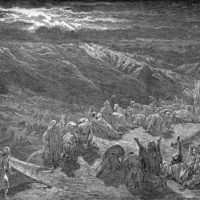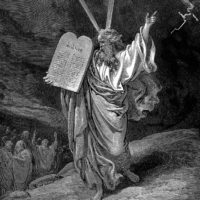A lot has happened in mine and my wife’s life since I wrote Part 1 of this article. I believe some of it has helped me have a deeper appreciation for the truths contained in these chapters. I hope I can convey them well here, and show their importance.
First we need to go back and look a little more deeply into 3 Nephi 24 which is the same as Malachi 3. 3 Nephi 7 states “Even from the days of your fathers ye are gone away from mine ordinances, and have not kept them.” While we previously discussed the idea that both ancient Israel, and us, “are gone away from” certain ordinances that the Lord calls His own, we didn’t address what these were.
What “ordinances” are we “gone away from?”
The Doctrine & Covenants is often a great place to find clarification on other scripture. Especially the Old & New Testaments, since they weren’t written for us, like the Book of Mormon was. D&C 84 was designated as “a revelation on priesthood” by the Prophet Joseph.
Verses 19 through 23 state:
19 And this greater priesthood administereth the gospel and holdeth the key of the mysteries of the kingdom, even the key of the knowledge of God.
20 Therefore, in the ordinances thereof, the power of godliness is manifest.
21 And without the ordinances thereof, and the authority of the priesthood, the power of godliness is not manifest unto men in the flesh;
22 For without this no man can see the face of God, even the Father, and live.
23 Now this Moses plainly taught to the children of Israel in the wilderness, and sought diligently to sanctify his people that they might behold the face of God;
The Lord tells us that Moses taught the children of Israel “plainly” that they could see the face of God. He taught them that the “greater priesthood” held the keys to this blessing, and that it was only through the “ordinances thereof, and the authority of the priesthood” that people could have this experience.
How & when the ordinances were “gone away from.”
The chapter continues:
24 But they hardened their hearts and could not endure his presence; therefore, the Lord in his wrath, for his anger was kindled against them, swore that they should not enter into his rest while in the wilderness, which rest is the fullness of his glory.
25 Therefore, he took Moses out of their midst, and the Holy Priesthood also;
26 And the lesser priesthood continued, which priesthood holdeth the key of the ministering of angels and the preparatory gospel;
So even though Moses taught them “plainly,” they rejected the blessings that God had offered to them. Blessings that could be obtained only through ordinances of the “Holy Priesthood.” God had offered them the greatest of gifts, and they had rejected it. No wonder He cursed that generation to die wandering in the wilderness. No wonder following generations were left largely without the blessings of the Melchizedek priesthood. Its hard to imagine being offered one of the greatest gifts the Lord can offer us mortals, much less being in the Lord’s position and having His people reject the offer of this specific gift. In the end I have to rely on my faith that God’s “judgment is just.”
Understanding all this, 3 Nephi 24:7-8 that we looked at in Part 1, becomes much more clear:
7 Even from the days of your fathers ye are gone away from mine ordinances, and have not kept them. Return unto me and I will return unto you, saith the Lord of Hosts. But ye say: Wherein shall we return?
8 Will a man rob God? Yet ye have robbed me. But ye say: Wherein have we robbed thee? In tithes and offerings.
Combining what we discussed in Part 1 with what we’ve just learned, we see that the ordinances gone away from, are those that teach us the ways of Godliness. Ordinances wherein we covenant to give all that we have, including our very will, to the Lord and His Church. Ordinances that ultimately allow us to see the face of God, just as Moses and others have. And only through the keys to these ordinances, could we ever even see the face of God, and not die from the experience.
The question here is if each of us have “gone away” from these ordinances like ancient Israel did? I don’t want to be found rejecting the opportunity to see God and know what its like to be in his presence. I find that asking myself a series of questions around this, helps me to determine where I’m at spiritually, and how I can improve:
- Do I attend the Temple regularly?
- Has the Endowment become merely a way to get to the Celestial Room or a way to feel like I can say “yes” to #1, but isn’t the empowering, enlightening experience it was intended to be?
- Do I see the Endowment as an end in itself, forgetting that the Initiation and Marriage ceremonies of the temple continue the Endowment in either direction, and that the covenants made in the Endowment are to be taken home with me and kept on higher and higher levels as I grow and improve?
- Finally, have I ceased to focus on the fact that the Endowment points to further ordinances wherein the promised blessings of the Endowment and Marriage become ours permanently?
NOTE: for a great discussion about the Law of Consecration and how we can begin to offer this sacrifice of ourselves, see this excellent series of articles over at TempleStudy.com about the Law of Consecration vs the United Order.
Further ordinances?
D&C 84 continues:
33 For whoso is faithful unto the obtaining these two priesthoods of which I have spoken, and the magnifying their calling, are sanctified by the Spirit unto the renewing of their bodies.
34 They become the sons of Moses and of Aaron and the seed of Abraham, and the church and kingdom, and the elect of God.
35 And also all they who receive this priesthood receive me, saith the Lord;
36 For he that receiveth my servants receiveth me;
37 And he that receiveth me receiveth my Father;
38 And he that receiveth my Father receiveth my Father’s kingdom; therefore all that my Father hath shall be given unto him.
39 And this is according to the oath and covenant which belongeth to the priesthood.
40 Therefore, all those who receive the priesthood, receive this oath and covenant of my Father, which he cannot break, neither can it be moved.
Notice in 34 that if we do what is required, we “become the sons of Moses and of Aaron,” why? Because their son’s rejected these ordinances. Thus if we receive them, we become their spiritual progenitors, picking up where they left off. Notice also that when we “receive this oath and covenant of [the] Father,” its a covenant that “he cannot break.” We aren’t included in what’s mentioned here. The Father makes an oath and as part of this ordinance, and we can see His face.
We’ll discuss what this means in Part 3 as we look at 3 Nephi 25 which is also Malachi 4 and D&C 2.
![]()
Continue reading at the original source →





